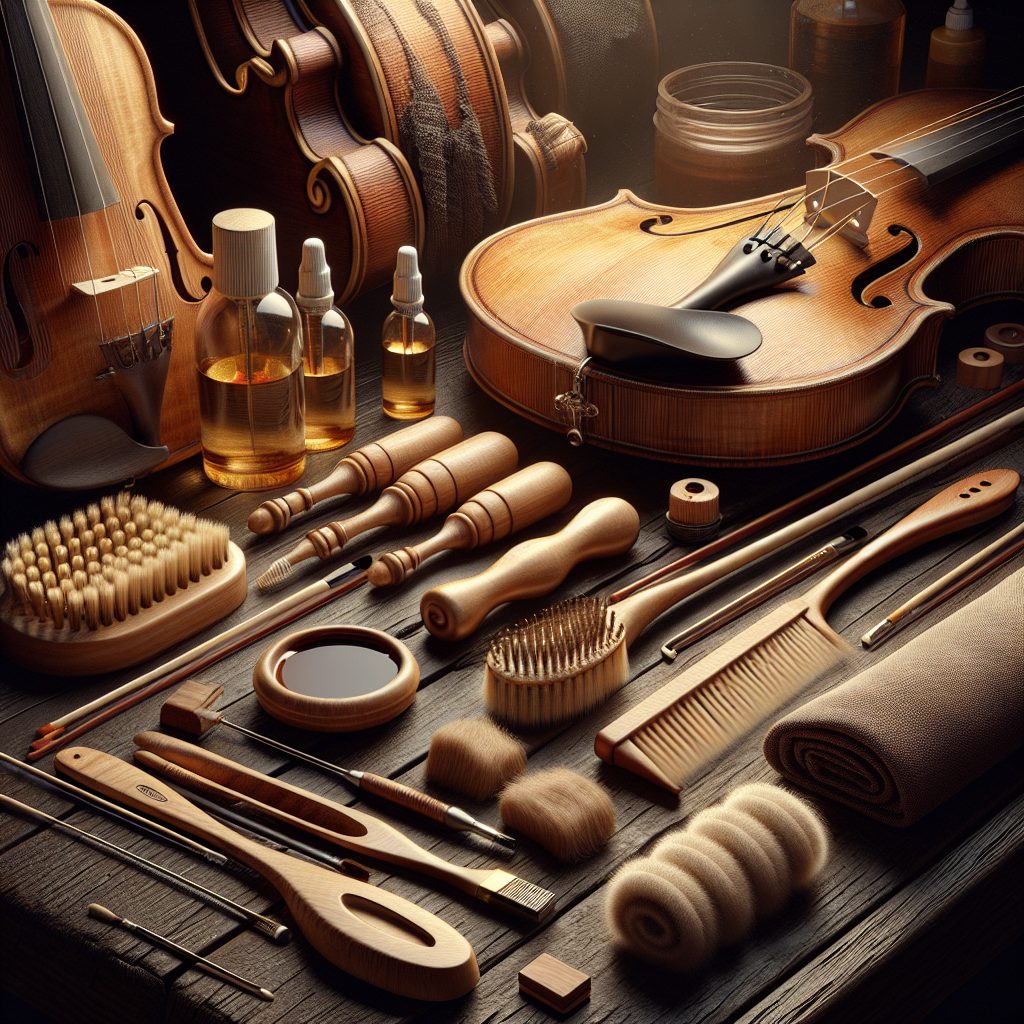Maintaining Wooden Instruments for Longevity is crucial for musicians and collectors alike. Wooden instruments, such as guitars, violins, and pianos, require special care to ensure their longevity and optimal performance. Did you know that wood is a porous material that can be easily affected by changes in humidity and temperature? This unique fact highlights the importance of maintaining wooden instruments to prevent damage such as warping or cracking.
When it comes to wooden instruments, there are specific impacts and unique features that need to be addressed to ensure their longevity. For instance, changes in humidity levels can cause the wood to expand or contract, affecting the instrument’s tone and playability. Additionally, excessive drying or exposure to direct sunlight can lead to the wood becoming brittle and more susceptible to damage. Furthermore, the accumulation of dirt, dust, and oils from fingers can degrade the instrument’s finish and affect the overall sound quality.
In the next part of this article, we will discuss key takeaways for maintaining wooden instruments for longevity. We will delve into essential tips and techniques that musicians and collectors can implement to protect their valuable instruments. From proper storage and regular cleaning to monitoring humidity levels and seeking professional maintenance, these practices can significantly extend the lifespan of wooden instruments. Stay tuned for valuable insights that will help you keep your wooden instruments in top-notch condition for years to come.
Key Takeaways
1. Proper humidity control is crucial for the longevity of wooden instruments. Maintaining a consistent humidity level between 40-60% helps prevent the wood from drying out or warping, helping musicians avoid costly repairs or instrument replacement.
2. Regular cleaning and gentle handling are vital for preserving wooden instruments. Using soft, lint-free cloths and gentle cleaning products specifically designed for wood ensure that instruments stay free from dirt and grime, keeping them in optimal condition.
3. Regularly inspecting and addressing any signs of damage or wear is essential to prevent further harm to wooden instruments. Cracks, loose joints, or worn varnish should be promptly repaired by a professional luthier to prevent further deterioration and maintain the instrument’s integrity.
4. Proper storage is key to preventing damage to wooden instruments during periods of non-use. Storing instruments in a climate-controlled room or protective case, away from extreme temperatures, direct sunlight, and excessive humidity, safeguards them from environmental hazards that could degrade their quality over time.
5. Regular maintenance, such as restringing, bridge adjustments, and periodic re-fittings, should be done by a skilled luthier to optimize the performance and longevity of wooden instruments. Professional care ensures that instruments are properly set up and in optimal playing condition, offering musicians the best sound quality and longevity possible.
How can you maintain wooden instruments for longevity?
Importance of Maintenance
Regular maintenance is crucial for wooden instruments to ensure their longevity. Proper care and upkeep can prevent damage, maintain their quality, and avoid costly repairs. Whether you’re a professional musician or an amateur enthusiast, here are some essential practices to help you maintain your wooden instruments effectively.
Cleaning
One critical aspect of maintaining wooden instruments is regular cleaning. Dust, dirt, and oils can accumulate on the surface, affecting both the appearance and sound quality. To clean your instruments properly, use a soft, lint-free cloth to wipe away any debris. Avoid using chemical cleaners that may damage the wood. Instead, use specialized instrument cleaning solutions that are specifically designed for wooden surfaces.
Humidity Control
Wooden instruments are highly sensitive to changes in humidity levels. Extreme dryness or moisture can cause the wood to contract or expand, leading to cracks or warping. To maintain optimal humidity conditions, store your instruments in a controlled environment. Use humidifiers to prevent excessive dryness, particularly during the winter months, and dehumidifiers to reduce moisture levels in humid climates or during summer.
Proper Storage
When not in use, proper storage plays a crucial role in preserving wooden instruments. Store them in a protective case to shield them from dust, accidental bumps, and temperature fluctuations. Ensure that the case is designed specifically for your instrument’s shape and size to provide optimal protection. Additionally, avoid direct exposure to sunlight or extreme temperature conditions, as they can warp or damage the wood.
String Replacement
For instruments with strings, regular string replacement is necessary for maintaining their sound quality and playability. Over time, strings can become worn out, lose their tonal characteristics, or even break. Learn how to replace strings correctly or seek professional assistance to ensure proper tension and alignment. Regularly check the condition of the strings and replace them as needed to avoid compromising your instrument’s performance.
Professional Check-Ups
Even with proper maintenance, it’s advisable to schedule regular check-ups with a professional instrument technician. These experts can detect potential issues, such as hidden cracks, loose fittings, or alignment problems, which may not be apparent to untrained eyes. Professional maintenance and adjustments will help keep your instrument in optimal condition and preserve its longevity.
How can you ensure the longevity of your wooden instruments?
1. Clean your wooden instruments regularly using soft, lint-free cloths and specialized cleaning solutions.
2. Control the humidity levels in the environment where you store your instruments to prevent cracks or warping.
3. Store your instruments in protective cases designed specifically for their shape and size.
4. Avoid exposing your instruments to direct sunlight or extreme temperature conditions.
5. Replace strings regularly to maintain the instrument’s sound quality and playability.
6. Schedule regular check-ups with a professional instrument technician for thorough maintenance and adjustments.
Frequently Asked Questions
How often should wooden instruments be cleaned?
Wooden instruments should be cleaned regularly to maintain their condition. It is recommended to wipe them with a soft, dry cloth after each use to remove any dirt or oils that may have accumulated on the surface.
Can I use cleaning products on my wooden instrument?
It is best to avoid using harsh cleaning products on wooden instruments as they can strip away the natural oils and finish, damaging the wood. Instead, opt for specialized cleaning solutions specifically designed for wooden instruments.
How should I store my wooden instrument?
Wooden instruments should be stored in a cool, dry place away from direct sunlight and extreme temperatures. It is also important to keep them in a protective case when not in use to prevent any accidental damage.
Is regular maintenance necessary for wooden instruments?
Yes, regular maintenance is crucial for the longevity of wooden instruments. This includes periodic restringing, adjusting the tension of the strings, and checking for any cracks or damages that may need repair.
What should I do if my wooden instrument gets wet?
If your wooden instrument gets wet, it is important to dry it immediately to prevent any warping or damage to the wood. Use a soft cloth to gently dry the instrument, and avoid using any heat sources like hair dryers, as they can cause the wood to expand and contract.
Can wooden instruments be polished?
Yes, wooden instruments can be polished to maintain their appearance and protect the wood. However, it is important to use a specialized instrument polish that is suitable for the particular type of wood and finish of the instrument.
How often should I replace the strings on my wooden instrument?
The frequency of string replacement depends on various factors like playing frequency, string quality, and personal preference. As a general guideline, it is recommended to change the strings every 3 to 6 months to ensure optimal sound quality and performance.
What should I do if I notice cracks in my wooden instrument?
If you notice cracks in your wooden instrument, it is essential to consult a professional instrument repair technician. They can assess the severity of the damage and provide the appropriate repair solutions to prevent further deterioration.
Can I repair minor damages to my wooden instrument on my own?
While minor damages like small scratches or dents can be addressed with appropriate care, it is always recommended to seek professional assistance for any significant repairs or adjustments. Attempting to repair complex damages without expertise may further harm the instrument.
How can I best protect my wooden instrument from environmental factors?
To protect your wooden instrument from environmental factors, always store it in a controlled environment with optimal humidity levels. Use a humidifier or dehumidifier if needed to maintain the ideal moisture content for the wood, preventing it from drying out or becoming too moist.
Final Thoughts on Maintaining Wooden Instruments for Longevity
Proper maintenance and care are essential for the longevity and performance of wooden instruments. By following the suggested guidelines, you can ensure that your instrument remains in optimal condition for years to come. Regular cleaning, storage in suitable conditions, and periodic maintenance checks are key in preserving the quality and integrity of the wood. Remember to consult professionals for any major repairs or concerns, as they have the expertise to handle delicate wooden instruments. With dedicated care, your wooden instrument will provide you with beautiful music for a lifetime.
In conclusion, treating your wooden instrument with the respect it deserves through proper maintenance will not only enhance its longevity but also enhance your playing experience. Investing time and effort into caring for your wooden instrument will reward you with improved sound quality, playability, and overall enjoyment. Remember, prevention is always better than cure when it comes to the well-being of wooden instruments. So, make it a habit to prioritize its maintenance and you will undoubtedly reap the benefits in the long run.

